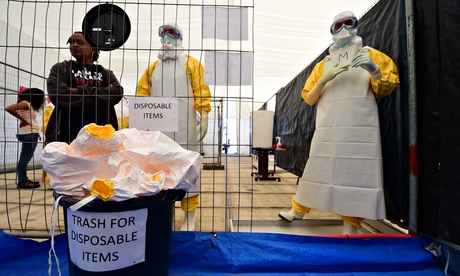Agencies say suspension of flights to and from Sierra Leone and Liberia is causing travel problems and sending wrong message

Aid agencies fighting the Ebola epidemic in west Africa say they are being hampered by the decision of British Airways to suspend flights to the region.
In August, BA announced it was halting flights to and from Sierra Leone and Liberia until December. It has now said the suspension will run until the end of March.
Médecins Sans Frontières, whose volunteer doctors have been on the frontline of the epidemic from the start, and Save the Children, which will run a new treatment centre in Sierra Leone built by the UK military, said BA’s decision was causing them problems and sending the wrong message to the world and to the people in the region.
“Airlines have shut down many flights and the unintended consequence has been to slow and hamper the relief effort, paradoxically increasing the risk of this epidemic spreading across countries in west Africa first, then potentially elsewhere,” said Christopher Stokes, the director of MSF in Brussels. “We have to stop Ebola at source and this means we have to be able to go there.”
More than 500 MSF volunteers have gone to the region, where international staff spend four to six weeks, to limit their exposure to the disease.
Save the Children has so far deployed 68 people to Sierra Leone and 40 to Liberia – including nurses, pharmacists, finance staff, psychologists, hygiene and sanitation experts, project managers and security managers – as well as equipment.
It was vital to get those people, and more in the future, to the affected countries, said Gemma Parkin, of Save the Children, on Tuesday.
“BA, in our view, could be a wonderful humanitarian air bridge,” she said. “What is odd is that the British government hasn’t stopped people coming back. It is a bit strange that BA should have taken this arbitrary stance.”
It is possible to reach Sierra Leone on other airlines, but it is slow and much less efficient. When Save the Children sent out a new financial officer for the region to manage the increase in its response he spent 30 hours at Casablanca airport while travelling with Royal Air Maroc. “We don’t have the time to be spending 30 hours in Casablanca airport,” Parkin said.
The suspension of flights was sending the wrong messages, she said. “We very much see this as a global problem and it needs a global response. The countries that are affected should not be left to do all this alone.”
A BA spokesman said the initial suspension had been “due to the public health situation in both of these countries”. It had been reviewing the situation regularly and had decided to continue the suspension through the winter season.
He said it was not because of commercial considerations. “We have quite a few different things to consider really. We put cabin crew, for example, on the ground in these countries or we did when we were flying. We have got to be sure that they are going to be safe and well while they are there.
“If you were a crew member and you cut yourself badly when you were staying there, would you be able to go to hospital and receive treatment, or is that not an option for you in those countries?”
Asked whether the airline could operate with volunteer crews, he said: “I don’t think that is really an option for us, unless someone was to charter an aircraft from us. We wouldn’t be able to make that work.”
